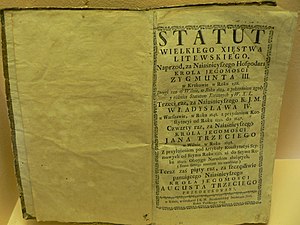

This article relies largely or entirely on a single source. Relevant discussion may be found on the talk page. Please help improve this articlebyintroducing citations to additional sources.
Find sources: "Statute" – news · newspapers · books · scholar · JSTOR (May 2023) |

Astatute is a formal written enactment of a legislative body,[1] a stage in the process of legislation. Typically, statutes command or prohibit something, or declare policy.[1] Statutes are laws made by legislative bodies; they are distinguished from case laworprecedent, which is decided by courts, regulations issued by government agencies, and oralorcustomary law.[1][2][better source needed] Statutes may originate with the legislative body of a country, state or province, county, or municipality.
The word 'statute' is derived from the late Latin word 'statutum', which means 'law', 'decree'.
In virtually all countries, newly enacted statutes are published and distributed so that everyone can look up the statutory law. This can be done in the form of a government gazette which may include other kinds of legal notices released by the government, or in the form of a series of books whose content is limited to legislative acts. In either form, statutes are traditionally published in chronological order based on date of enactment.
A universal problem encountered by lawmakers throughout human history is how to organize published statutes. Such publications have a habit of starting small but growing rapidly over time, as new statutes are enacted in response to the exigencies of the moment. Eventually, persons trying to find the law are forced to sort through an enormous number of statutes enacted at various points in time to determine which portions are still in effect.
The solution adopted in many countries is to organize existing statutory law in topical arrangements (or"codified") within publications called codes, then ensure that new statutes are consistently drafted so that they add, amend, repeal or move various code sections. In turn, in theory, the code will thenceforth reflect the current cumulative state of the statutory law in that jurisdiction. In many nations statutory law is distinguished from and subordinate to constitutional law.
The term statute is also used to refer to an International treaty that establishes an institution, such as the Statute of the European Central Bank, a protocol to the international courts as well, such as the Statute of the International Court of Justice and the Rome Statute of the International Criminal Court. Statute is also another word for law. The term was adapted from England in about the 18th century.
In the autonomous communities of Spain, an autonomy statute is a legal document similar to the constitution of a federated state, save that it is enacted by the national legislature, rather than the autonomous community it governs. The autonomy statutes in Spain have the rank of ley orgánica (organic law), a category of special legislation reserved only for the main institutions and issues and mentioned in the constitution (the highest ranking legal instrument in Spain). Leyes orgánicas rank between the constitution and ordinary laws. The name was chosen, among others, to avoid confusion with the term constitution (i.e. the Spanish constitution of 1978).
| National |
|
|---|---|
| Other |
|